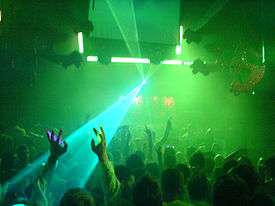Superclub
- This page relates to a form of nightclub. For the video store chain in Quebec, see Le SuperClub Vidéotron.


Superclub is a term used to refer to a nightclub owned and managed by a dance music record label, such as The Haçienda club, which was owned by Factory Records. The term has also been used to describe large, multistory, high-capacity high-profile nightclubs, such as Pacha in Ibiza, or 1970s discotheques such as New York City's Studio 54 (opened in 1977) and The Saint (opened in 1980), and London's Heaven (opened in 1979), which were earlier versions of the genre.
Juliana's Tokyo which opened in Japan in May 1991 is probably the worlds most successful superclub.
Record label-owned clubs
House superclubs such as Twilo in the United States opened in 1990, other massive House superclubs such as The Haçienda in Manchester opened in 1982, (playing house, from 1986), and the Ministry Of Sound in London opened in 1991. These clubs became more popular in the early 1990s. Examples include Gatecrasher, Godskitchen, Mansion, Crobar, Paradise Garage and The End. Other high-profile US Superclubs include Cielo (NYC), Pacha (NYC), Centrofly (NYC), Ikon (NYC), Bungalow 8 (NYC), Vision (Chicago), Sound Bar (Chicago), MIGHTY (San Francisco), Mezzanine (San Francisco), Myth (Minneapolis), The Church (Denver), Pure (Las Vegas),Las Vegas (Las Vegas), Tao (Las Vegas), Mansion, Prive, Opium Garden (The Opium Group) (Miami), Avalon/Avaland (Boston/Los Angeles), Balance (Los Angeles), KING KING (Los Angeles), Vanguard (Los Angeles), Belo (San Diego), Nation (Washington D.C.) Fur (Washington D.C.), and 1015 (San Francisco).
British Superclubs include Ministry of Sound, Fabric (London), The Republic (Sheffield) (closed June 2007), Nation (Liverpool) Turnmills (London, closed March 2008) Air (Birmingham), Trade London, and The Emporium, Coalville.
All of which have made high-profile bookings to ensure their status as a "Superclub".
German superclubs tend to play trance or techno music. Superclubs like Berghain are often situated in industrial areas, especially in suburbs of big towns or near freeways or expressways. These superclubs are in Germany called "Grossraumdiskothek" and are often visited by people coming from larger distances to them by car.
These German superclubs are known across several regions, but they are rarely nationally known. Many of them have expensive lightshows in stylish, air-conditioned venues. In many superclubs one gets a pay card, in most cases a chipcard, sometimes also a hole card, at the entrance, on which drinks and meals are booked. Pay cards reduce the necessary amount of exchange money in the discotheque, but their usage often leads to long queues at the exit, because all people in the club have to pay then their fee at the exit. Pay cards are nearly always property of the club and are given back to the club after the patron has paid their tab. To prevent patrons from leaving after a night of drinking without paying, emergency exits of superclubs using pay cards may be alarmed. Despite the danger of trapping people inside during a fire, emergency exits are sometimes illegally locked in superclubs that use pay cards.
Spanish Superclubs include Privilege Ibiza, Space Ibiza, Amnesia, Ibiza.
Large nightclubs
The term "superclub" is also used to describe large, multistory, high-capacity high-profile nightclubs earlier versions include. Pacha in Ibiza, which opened in 1973. Pacha has branches in London, New York City, Madrid, Munich, São Paulo and Buenos Aires. Annabel's in London as well as Heaven which opened in 1979 (previously called Global Village 1976-1979) and Studio 54 in New York City and the Saint nightclub (both of which are now closed).
Superclub the album
Cream, Gatecrasher and Pacha teamed up in 2010 to produce the album ‘Superclub’. Released on 22 November in the UK, the 3 CD collection features one disc for each of the clubs and was the first release from Rhino UK's dance imprint One More Tune.[1] A second album, called 'Superclub Ibiza', was released in July 2011 by EMI.